By Will Hunter
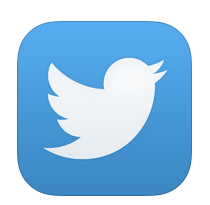 @Will_Hunter89
@Will_Hunter89
This weekend, the Southern Football Netball League will break new ground as it becomes the first organisation in Australia to extend a celebration of pride across an entire league of football.
The inaugural SFNL Pride Round is another step forward in the League’s desire to stamp out homophobia in sport, and create an environment where members of the LGBTI+ community feel they are not only welcome, but have the opportunity to play key roles within the SFNL.
And it is a cause with particular resonance for Endeavour Hills midfield ace Ashlee Ladson.
The bubbly, charismatic and down to earth 26-year-old is one of many gay female footballers around the country, and throughout her career, she has witnessed first-hand not only the gradual cultural shift in general attitudes towards female footballers, but also the acceptance of players of non-hetero and gender diverse backgrounds within the sphere of women’s football.
Ladson has been involved in football for close to 20 years, and admits the sport has always been a big passion of hers from a very young age.
“I grew up around (footy with) my cousins, my dad, my brother, kind of always been around footy clubs and realised pretty quickly that they were a great place to be,” Ladson said.
“I always had a footy in my hand and it was pretty natural for me to choose to play football. I played soccer for a little bit, but always, always wanted to play football competitively.”
Ladson began kicking a footy around with her cousins at the tender age of six, but it wasn’t until high school that she was given the opportunity to play football at a competitive level. She played school football with Mount Lilydale from Year 9 to Year 12, a stint that included two narrow grand final losses to rivals Luther.
She commenced her senior football career with St John’s Old Collegians in 2010, starting out on a wing before transferring across Hallam in 2013. Ladson joined Endeavour Hills in 2015 and quickly established herself as a key component in the Falcons’ midfield.
Initially drawn to the uniqueness and competitive aspects of football, it was the comradery and friendships she has made during her career that has ensured her long-term involvement in the game.
And Ladson has preserved with her career, despite some raised eyebrows and judgements from narrow-minded sections of the community.
Ladson recalled several past instances where people, often complete strangers, would give her odd looks and make sly comments when they learned of her chosen sporting pursuit, which she attributed to the stigma that was previously attached to senior women’s football.
“(There was) the stigma of women’s footy, if you play women’s footy then that must mean that you’ve got short hair, you’ve got tattoos, and you must be a lesbian or something, and they make assumptions of how I live my life, and how my friends live their lives when in actual fact, all we are doing is playing football,” Ladson explained.
“Yeah, it’s not great, but it definitely teaches you how to be a positive person and not judge other people.
“To be honest, I wasn’t surprised (by it). I think I was old enough to, not expect it, but not be completely blow out of the water by it.”
Ladson believes the introduction of the AFLW has gone a long way to changing both the prejudices and perceptions of women’s football, as well as long-held traditional stereotypes of female players.
The elite women’s league has also done so much for members of LGBTI+ community, with many stories of several openly gay AFLW players being shared through mainstream media channels, and Ladson hopes that this level of openness and acceptance can transcend into the realms of men’s football sooner rather than later.
For Ladson personally, her sexuality is not a topic of discussion that gets much air time. That’s not because she deliberated seeks to hide it, but because she doesn’t view it as an important enough aspect of her life to be regularly brought up in conversation.
“I wouldn’t say I am openly gay or anything like that, but the important people in my life know, my parents, a few cousins I’ve told, my brother, a few best friends here at the club. And then after that I don’t tell everybody because it’s just who I am so I don’t make it a big deal,” Ladson said.
“(My sexuality) is not 100% who I am, it’s only a part of who I am, so it’s not a big deal.”
Ladson struggles to recall the moment she came out to the key people in her life with any clarity, further highlighting the little relevance she attaches to her sexuality, although she reveals that her parents had placed a greater emphasis on her happiness than her sexual preference.
However, she does recall grappling with initial thoughts of confusion and uncertainty around her sexuality, a relatable experience for many in the LGBTI+ community, and particularly those in their teenage years.
Ladson credits her closest friends, to whom she came out first, for helping her process her “muddled” thoughts and alleviate a lot of her stress.
“I didn’t know (my sexuality) until a late stage of my life, maybe five years ago or something like that,” she revealed.
“Some people know when they are five years old, and I didn’t know how everybody is different. That’s what threw me a lot, because I was 19, 20 and I was like, well, what the hell has been going on for 20 years? I don’t understand.
“It was really confusing. And then it was like, what am I supposed to do? Who do I even tell? Are people going to think I am crazy?
“I tried to figure it out myself, but I had really good people around me that have different experiences in life and I kind of spoke to them because I was pretty stressed about it.
“They calmed me down and said, ‘you don’t have to put yourself into a box and be that person for the rest of your life. How you feel now, you could feel differently later, (so) don’t stress’. That was really, really helpful.”
Homophobic slurs have been identified as a key reason why members of the LGBTI+ community are reluctant to engage in sporting activities. And while its use is not as common on the field in women’s football, it has been traditionally prevalent in the male sporting vernacular.
Off-field, too, its impact is widespread. Ladson herself has been the recipient of homophobic language, and although it was used to a large extend out of ignorance more than malice, she hopes the community can be further educated about its negative effects.
“The word, gay, is it a bad thing to use that word? It shouldn’t be, but unfortunately people do use it in a bad way,” Ladson said.
“And I’ve snapped at people before and told them to stop using that word, because it’s stupid, and they didn’t know that I was gay.”
The inaugural season of the AFLW was a resounding success in terms of helping bring about wider acceptance of non-hetero and gender diverse people, and Ladson believes if the AFL can lend their visible support to the cause, then it will go a long way towards normalising homosexuality within the community and ensuring members of the LGBTI+ community feel welcomed in sport.
In the interim, Ladson has lent her support to this weekend’s history SFNL Pride Round and sees it having a massive impact at a grassroots level, particularly in terms of breaking down homophobic barriers in male-dominated sports.
“(The SFNL Pride Round) will be huge for a number of reasons, but the biggest perspective I would notice is going to a footy match or anything in community and seeing someone hold their partner’s hand or kiss on the cheek and not (having anyone) say anything unless it’s positive,” she said.
“I think it will give more people the courage to turn around and be like, ‘why are you making these statements, they are just people?’ Seeing it in everyday life, like a football match, I think it would be huge, absolutely huge.”
Disappointingly, the Falcons’ star midfielder will likely miss the opportunity to take the field this weekend as she is scheduled to undergo a knee reconstruction on Monday. However, Ladson will instead look to contribute off the field, having immersed herself in an assistant coaching role since rupturing her ACL earlier in the season.
The Endeavour Hills Senior Football Club has been a massive supporter of the SFNL Pride Round since day one, with the Falcons’ Women’s Football Coordinator, Gail Worsley, leading the charge.
And the club’s stance is yet another example of the unity and support that football can provide and has filled Ladson with a great deal of pride.
“Gail’s been great, everyone else has been great… It makes me proud because it shows me personally that I have got good people around me and there’s good people at the club,” Ladson said.
For those suffering from any mental health issues, beyondblue support services are available 24 hours a day, seven days a week. Visit beyondblue.org.au for more information on how you can get help.
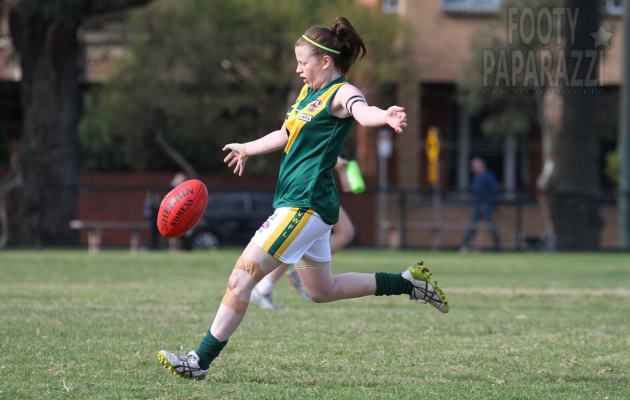
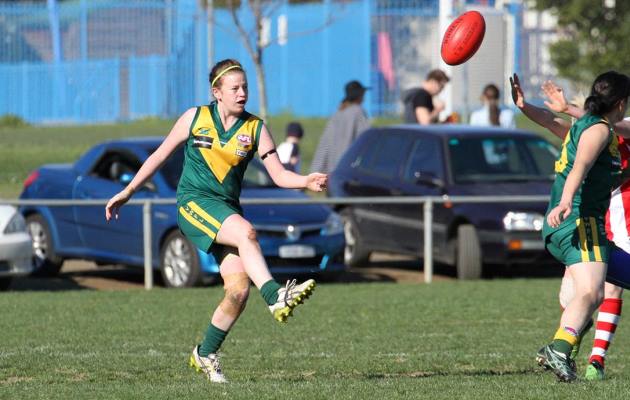
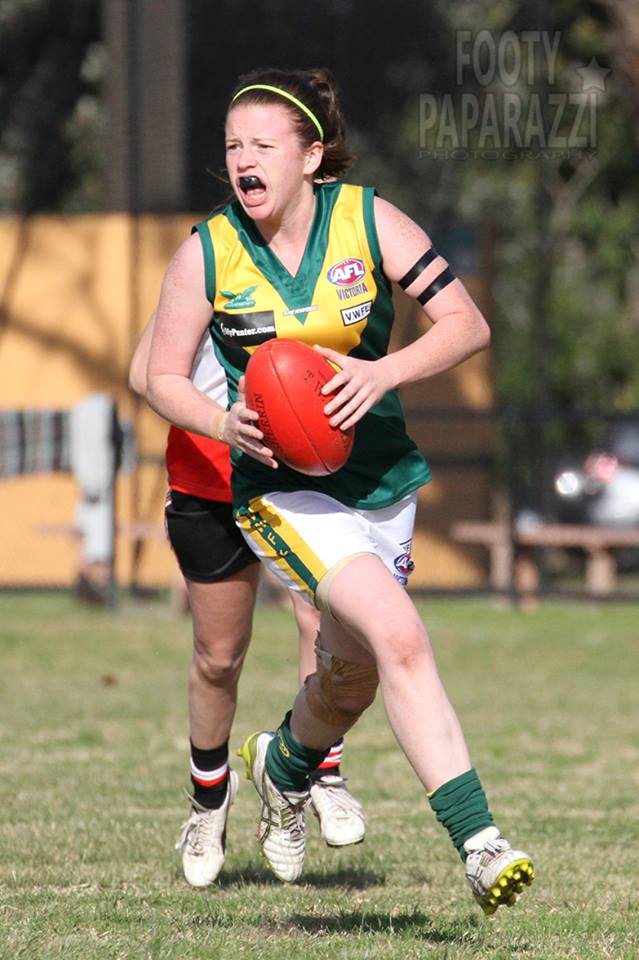
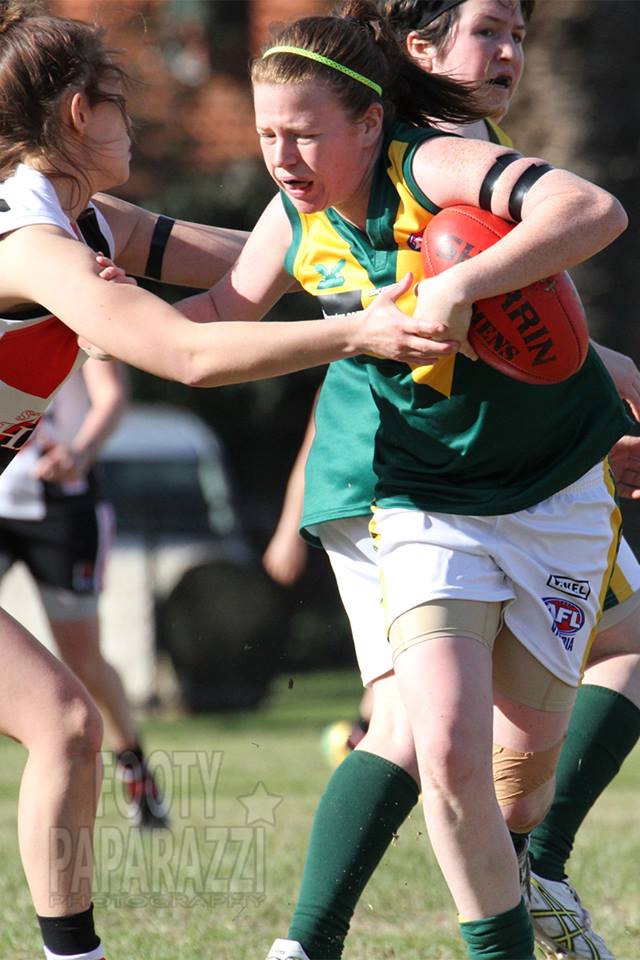
 @Will_Hunter89
@Will_Hunter89


